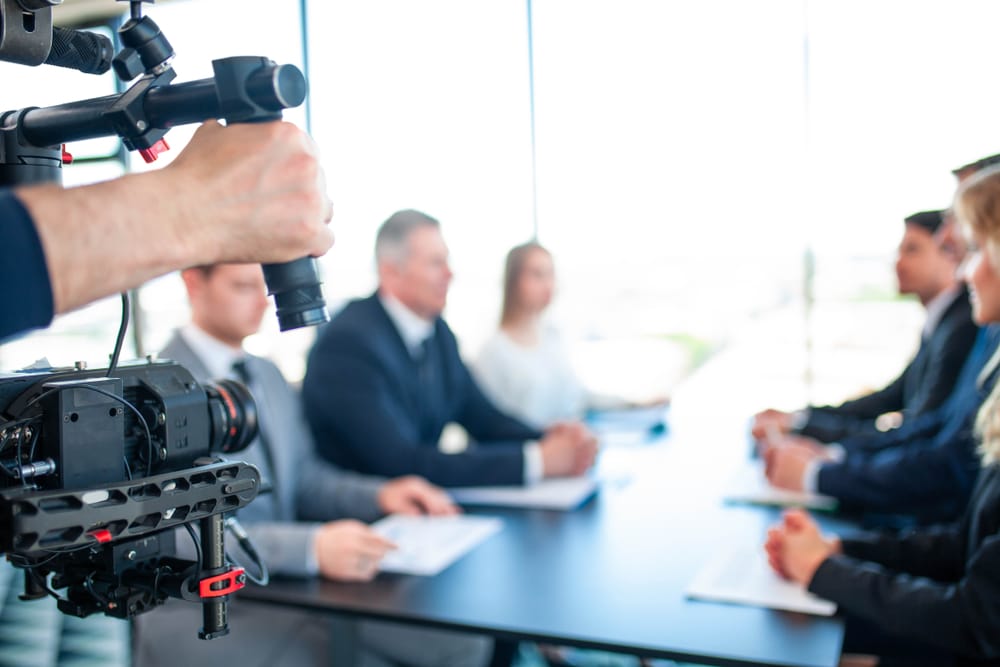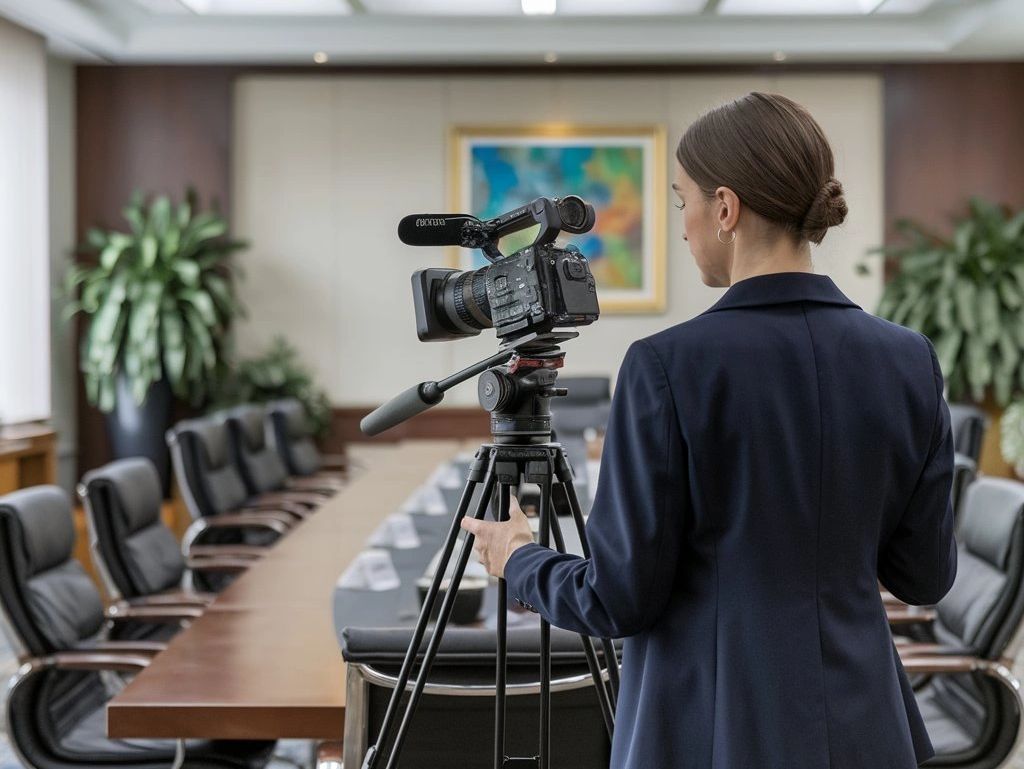A comprehensive guide to legal video depositions: What attorneys need to know
Wiki Article
The Significance of Legal Video Clip Depositions in Modern Legal Services: What You Must Know
Lawful video depositions have become crucial in today's legal landscape. They provide a multidimensional sight of witness statements that standard records merely can not match. By catching both verbal and non-verbal communication, these depositions enhance the general understanding of a witness's trustworthiness. However, the performance of video depositions depends upon numerous factors, including conformity with legal criteria and finest methods (legal video depositions). Checking out these elements exposes their true significance in modern legal solutionsWhat Are Legal Video Clip Depositions?
Lawful video depositions serve as a crucial tool in the lawsuits procedure. They entail tape-recording witness testimonies in a video clip layout, catching both spoken and non-verbal interaction. This technique permits attorneys to record the temperament, expressions, and reactions of witnesses, providing a richer context for the testimony. Normally carried out in a controlled setting, these depositions are led by attorneys that ask concerns while a stenotype reporter records the dialogue. The resulting video clip can be important for trial prep work, as it enables legal representatives to evaluate the integrity of witnesses and refine their approaches. In addition, lawful video depositions can be used in different lawful contexts, ranging from civil disputes to criminal cases. The visual and acoustic aspects of video depositions enhance the discussion of evidence, making it an essential element in the contemporary legal landscape. On the whole, they contribute considerably to the performance and effectiveness of lawful proceedings.
Advantages of Video Clip Depositions Over Traditional Methods
Video depositions offer many advantages contrasted to typical approaches of taking witness statements. One significant advantage is the ability to catch both audio and aesthetic elements, giving a much more comprehensive document of the witness's statements. This twin format boosts clearness and enables lawyers to reference details subtleties throughout test prep work. In addition, video depositions facilitate remote engagement, making it less complicated for witnesses that may be unavailable for in-person appearances because of geographical constraints or health issues.Moreover, video clip depositions can speed up the overall deposition procedure, decreasing the moment and expenses linked with traveling and logistics. They likewise improve ease of access, as taped depositions can be quickly shared amongst lawful teams and referenced at any moment. This comfort adds to far better situation monitoring and preparation. Overall, video clip depositions represent a modern, reliable approach to gathering witness testaments, lining up with the evolving needs of the legal career.The Duty of Body Movement and Tone in Testimonies

In legal video clip depositions, body language and tone play essential functions in conveying a witness's integrity and trustworthiness. Nonverbal cues can offer insights right into a witness's emotion, influencing just how their testament is perceived. Understanding the impact of these components is vital for jurors and lawyers alike when reviewing the reliability of a statement.
Nonverbal Communication Insights
While verbal interaction is often stressed in legal testaments, nonverbal signs such as body movement and tone play an important role in sharing reputation and feeling. Onlookers of depositions may note that a witness's stance, motions, and faces can significantly affect perceptions of dependability. For circumstances, constant eye get in touch with might indicate self-confidence, while avoiding stare can suggest dishonesty or pain. The tone of voice-- its volume, rate, and pitch-- can present sensations of genuineness or unpredictability. Lawful specialists should be attuned to these nonverbal signals, as they usually offer critical context that complements talked words. Recognizing these subtleties can boost the performance of depositions and affect the outcome of lawful process.Psychological Tone Effect
The psychological tone shared during legal testaments considerably influences how a witness is perceived. Body language, singing inflections, and faces play essential functions in forming the narrative of a testimony. A witness exhibiting self-confidence with consistent eye contact and a calm tone can infuse a feeling of integrity and interaction. Alternatively, indications of anxiety, such as fidgeting or a shaky voice, may lead to uncertainty concerning their account. The nuances of emotional expression can affect the interpretation of realities, making it necessary for attorneys to recognize these cues. In video clip depositions, the visual and acoustic components integrate, highlighting the significance of emotional tone in communicating sincerity and truthfulness within the lawful process.Reliability and Dependability
An essential consider establishing integrity and trustworthiness during statements exists in the witness's body movement and tone of voice. Observers frequently count on non-verbal cues-- such as eye contact, position, and motions-- to analyze a witness's sincerity. For instance, a witness that maintains eye contact and displays open body movement may be perceived as even more truthful and reliable than one who stays clear of eye contact or appears blocked. Additionally, tone of voice plays an important role; a stable, tranquil tone can enhance the reputation of the statement, while changes in pitch or quantity might raise doubts. Inevitably, the mix of body language and singing tone greatly affects how a witness's statements are gotten and interpreted in a lawful context.Finest Practices for Carrying Out Video Clip Depositions
Carrying out video depositions calls for mindful preparation and implementation to guarantee a reliable and clear presentation of testimony. First, it is crucial to select a quiet, well-lit location to minimize diversions and protected optimal video high quality. The devices must be evaluated in breakthrough, consisting of video cameras, microphones, and lights, to avoid technical concerns throughout the deposition.Next, parties included need to review the layout and procedures in advance, making certain that every person understands their duties. The deponent needs to be oriented on the procedure, consisting of just how to respond plainly and concisely.Additionally, maintaining a specialist disposition throughout the session is important. This includes avoiding talking over one another and verifying that all questions are directed appropriately. It is crucial to tape-record the deposition in a style that permits for easy playback and testimonial, preserving the integrity of the testimony for future usage.Lawful Considerations and Conformity Issues
Just how do legal considerations and compliance concerns influence the performance of video depositions? Lawyers must browse a complex landscape of regulations, making sure that video depositions comply with jurisdictional policies and requirements. Conformity with regulations worrying privacy, approval, and recording techniques is necessary. As an example, obtaining explicit authorization from all events entailed is essential to avoid legal repercussions.Additionally, the admissibility of video proof in court can rest on compliance with procedural demands. Guaranteeing that the devices made use of meets technical requirements is likewise vital, as low quality can threaten the deposition's reliability.Moreover, lawyers must understand any kind of details state regulations that regulate video depositions, as these can differ greatly. Failure to address these factors to consider can not only jeopardize the honesty of the deposition yet likewise affect the total situation strategy, eventually impacting the customer's legal outcomes.Just How Video Depositions Impact Jury Understanding
While video clip depositions can work as effective tools in lawful process, their impact on jury assumption is substantial. The auditory and aesthetic elements of video recordings supply jurors with a more detailed understanding of witness behavior, reputation, and emotional actions. This multimedia method can boost the jurors' capacity to analyze the dependability of statement contrasted to standard text-based transcripts.Moreover, video clip depositions allow jurors to observe body movement, tone of voice, and facial expressions, all of which can affect their interpretation of the witness's statements. The presence of a witness on display can humanize them, fostering compassion and link, which may persuade jurors' viewpoints. Conversely, a witness that shows up untrustworthy or incredibly elusive on video clip might bring about negative perceptions that affect a court's choice. Ultimately, the dynamic nature of video clip depositions plays a crucial duty fit exactly how jurors analyze evidence and reach their judgments.The Future of Video Depositions in Legal Method
As innovations in technology remain to improve the legal landscape, the future of video clip web depositions is poised for significant evolution. Advancements such as man-made knowledge, virtual reality, and boosted video conferencing tools are anticipated to streamline the deposition process and boost ease of access. Attorneys might use AI-driven analytics to analyze witness reputation and case toughness more effectively.Moreover, the integration of online truth can allow juries to experience immersive simulations of depositions, giving deeper context and understanding. In addition, the trend toward remote depositions is likely to linger, using better adaptability for clients and attorneys alike.As remote job ends up being increasingly normalized, video clip depositions will likely end up being standard technique, decreasing costs and time restraints related to traditional methods. On the whole, these technical developments promise to enhance the efficiency, effectiveness, and availability of video clip depositions in lawful technique, ultimately changing just how lawyers get ready for test.Regularly Asked Inquiries
How Much Do Legal Video Clip Depositions Usually Expense?

Can Video Clip Depositions Be Used in Any Type Of Sort Of Case?
Video depositions can be used in numerous kinds of situations, including civil, criminal, and family regulation. Their flexibility allows attorneys to present witness testaments effectively, adapting to the specific needs of various legal scenarios.What Devices Is Required for a Video Deposition?
To conduct a video clip deposition, important equipment consists of a top notch camera, microphone, lights, and a dependable recording device. In addition, a computer with editing software may be required for post-production and formatting the final video clip.The length of time Does a Normal Video Clip Deposition Last?
A regular video deposition lasts between two to four hours, depending upon the complexity of the instance and the number of concerns presented. Extended sessions might happen, yet breaks are generally integrated for participant comfort.

Are Video Clip Depositions Admissible in Court?
Video clip depositions are normally admissible in court, provided they abide by legal criteria and regulations of proof. Their use boosts quality and maintains witness testament, helping in the judicial process during hearings and trials. Legal video depositions have actually come to be vital in today's legal landscape. In addition, lawful video depositions can be utilized in numerous legal contexts, varying from civil disputes to criminal instances. Additionally, read what he said video clip depositions assist in remote engagement, making it simpler for witnesses that might be not available for in-person appearances due to best site geographical constraints or wellness issues.Moreover, video clip depositions can quicken the total deposition procedure, lowering the time and expenses linked with traveling and logistics. Ensuring that the equipment made use of meets technological standards is additionally crucial, as bad quality can undermine the deposition's reliability.Moreover, attorneys need to be conscious of any particular state legislations that regulate video clip depositions, as these can vary considerably. Furthermore, the fad towards remote depositions is likely to persist, supplying greater versatility for clients and lawyers alike.As remote job ends up being significantly normalized, video clip depositions will likely become typical method, minimizing costs and time restraints associated with standard approaches.Report this wiki page